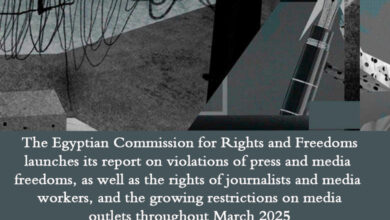The Egyptian Commission issues its comment on the draft law
A new draft of the Criminal Procedure Code: a legislative disaster that maintains the defects of the current law and exacerbates them by legalizing illegal practices.

The Egyptian Commission for Rights and Freedoms announces its rejection of the new Criminal Procedure Law draft due to its catastrophic provisions, which perpetuate the flaws of the current Criminal Procedure Law. These flaws include concentrating the powers of investigation, prosecution, and referral in the hands of the Public Prosecution and protecting judicial officers from accountability for human rights violations such as torture and enforced disappearances.
The draft law further institutionalizes unlawful practices that undermine the right to a fair trial and defense rights. For example, it prohibits lawyers from speaking outside of submitting pleas and requests without permission from a prosecutor, and grants prosecutors the right to prevent a defense lawyer from accessing the investigation.
The Egyptian Commission for Rights and Freedoms has issued a position paper analyzing the key provisions of the new Criminal Procedure Law draft, which is currently being discussed in the legislative committee of the Egyptian Parliament.
Although the draft claims to aim at improving the efficiency of the judicial system and expediting the pace of justice, it conceals severe risks that threaten human rights and destroy the remaining trust in the judiciary.
The paper points out that the proposed amendments grant the Public Prosecution and judicial officers unprecedented powers at the expense of the rights of defendants and defense rights. For instance, it gives the Public Prosecution broad authority to issue orders to record conversations occurring in private places, and grants judicial officers discretionary powers to interrogate defendants, thereby reinforcing executive authority and weakening the judiciary’s role as a protector of individual rights.
These amendments could lead to serious violations of constitutional rights and make it difficult for defendants to obtain a fair trial.
Furthermore, the amendments related to pre-trial detention, despite shortening its duration, still allow the Public Prosecution to extend the detention of individuals for long periods without trial and do not ensure the cessation of practices like rotating detainees, which allow manipulation of the legal pre-trial detention periods.
Such practices represent a serious threat to individual freedom and increase the likelihood of abuse of power.
The arbitrary use of pre-trial detention in Egypt to arrest individuals based on their opinions has faced widespread criticism from human rights organizations over the years. The current Criminal Procedure Law is not the sole cause of arbitrary arrest and detention but is also complemented by repressive laws criminalizing the exercise of freedom of opinion and expression, freedom of peaceful assembly, and the formation of associations, such as the Penal Code, the Anti-Terrorism Law, the Electronic Crimes Law, the Protest Law, and the NGOs Law. These laws are used as tools to punish political opponents, activists, and any citizen who peacefully expresses their views.
Although the draft law attempts to reduce the duration of pre-trial detention in certain cases, the broad exceptions it includes may lead to the continuation of these arbitrary practices without genuine deterrence.
These amendments place the state in a position that conflicts with its international obligations and heighten concerns about using pre-trial detention as a means to pressure individuals or silence dissenting voices.
The draft also addresses the regulation of travel bans, which raises significant concern due to its direct impact on citizens’ freedom of movement, a fundamental right guaranteed by the Egyptian Constitution. While the draft aims to address the legislative gap that previously allowed a ministerial decision to regulate these bans, it effectively broadens the range of entities that can request such orders to include multiple security agencies and increases the number of offenses subject to this measure, even including misdemeanors punishable by imprisonment.
Despite providing the right to appeal these orders, the draft imposes strict limitations on this right, raising fears that travel bans could be used as a tool to pressure political activists and opponents, reflecting a trend towards curtailing fundamental freedoms rather than enhancing them.
Additionally, the paper analyzes the amendments that restrict defense rights and weaken the role of lawyers in protecting their clients. Granting the Public Prosecution powers to prevent lawyers from accessing case files or participating actively in investigations constitutes a violation of the defendant’s right to defense and undermines the principles of justice.
The draft Criminal Procedure Law raises serious concerns about the decline of human rights guarantees in Egypt. The expansion of Public Prosecution powers at the expense of the judiciary, the reduction of defense rights, and the continuation of pre-trial detention abuses all point to a troubling trend towards strengthening state control over the judicial process and undermining judicial independence.
The Egyptian Commission for Rights and Freedoms calls on all stakeholders concerned with criminal justice and the right to a fair trial to firmly oppose the draft law that undermines the foundations of justice in Egypt.
We commend the stance of the Lawyers Syndicate and the Journalists Syndicate in rejecting the new Criminal Procedure Law draft and call for a comprehensive and transparent review of the draft, involving all relevant parties to ensure that the proposed amendments align with the Egyptian Constitution and international human rights standards.
The Commission also recommends withdrawing the proposed draft law and conducting a comprehensive consultative process involving all concerned parties, including civil society organizations and legal experts.
Egypt needs laws that enhance its citizens’ rights and protect justice, not legislation that tightens security control and undermines fundamental freedoms.
We believe that the protection of human rights should be at the heart of any legal reform, and true justice can only be achieved by ensuring defense rights and fair trial guarantees for all.





